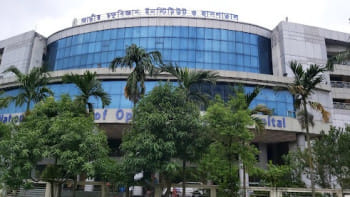Aus cultivation unlikely to expand
Low prices of paddy and inadequate rainfall are set to affect the expansion of aus paddy cultivation, frustrating the government’s efforts to popularise the farming of the staple this season through incentives to growers.
The Department of Agricultural Extension (DAE) had earlier set the target of ensuring plantation of the summer rice crop on 13.66 lakh hectares this season.
But until Wednesday the crop has been planted on 10.98 lakh hectares, which was 4.38 percent below the plantation area achieved in the previous aus season, according to data from the DAE.
Officials said they would count rice cultivation under aus area until the middle of July.
“We expect that acreage will exceed last year’s level,” said Md Abdul Muyeed, director of the DAE’s field services wing.
Aus area has been rising since fiscal 2016-17 thanks to incentives from the government.
Thanks to availability of monsoon water farmers do not have to irrigate fields during aus season and in so doing end up with lower production cost than the irrigation-based boro paddy, officials said.
This year, the government provided Tk 40.18 crore worth of incentive to 4.59 lakh farmers. Each farmer will get 5 kilograms of seeds, 15 kg of diammonium phosphate (DAP) and 10 kg of muriate of potash (MOP) for cultivation on each bigha.
Last year the agriculture ministry gave Tk 39 crore of incentive to 2.02 lakh growers, according to Muyeed.
Yet, the DAE is unlikely to achieve its target.
“It appears that many farmers are reluctant to grow Aus. Low rainfall is another reason,” he said.
Seasonally, aus is the second crop in the calendar after boro, the principal crop. And farmers suffered losses for slumping prices of paddy, impacted by good harvest of boro and previous aman paddy, and higher of stock of the grain in public and private sector.
Wholesale prices of coarse boro paddy was Tk 1,400 per quintal on Wednesday, down 5.36 percent from Tk 1,475 a month earlier. Last year, the prices of the coarse grain was Tk 1,770 per quintal, according to the Department of Agricultural Marketing.
The prices of paddy grew after the government’s announcement of incentives for rice export to revive prices of the grain, said KM Layek Ali, general secretary of the Bangladesh Auto Major and Husking Mills Association.
“Prices dropped later.” As a result, farmers are holding back from cultivating aus.

 For all latest news, follow The Daily Star's Google News channel.
For all latest news, follow The Daily Star's Google News channel. 



Comments